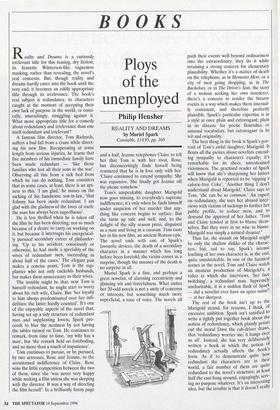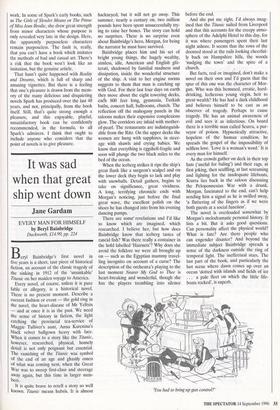BOOKS
Ploys of the unemployed
Philip Hensher
REALITY AND DREAMS by Muriel Spark Constable, £14.95, pp. 160
Reality and Dreams is a curiously irrelevant title for this teasing, dry fiction; its Jeanette Winterson-like vagueness masking, rather than revealing, the novel's real concerns. But, though reality and dreams hardly enter into the book until the very end, it becomes an oddly appropriate title through its irrelevance. The book's real subject is redundancy, its characters caught at the moment of accepting their own lack of purpose in the world, or comi- cally, unavailingly, struggling against it. What more appropriate title for a comedy about redundancy and irrelevance than one itself redundant and irrelevant?
A famous film director, Tom Richards, suffers a bad fall from a crane while direct- ing his new film. Recuperating at some length from serious injuries, he learns that five members of his immediate family have been made redundant — 'like those families who lost all their sons in the war'. Observing all this from a sick bed from which he can do nothing, Tom considers that in some cases, at least, there is an apt- ness to this. 'I am glad,' he muses on the sacking of his handsome son-in-law, 'that Johnny has been made redundant. I am glad with the gladness of the lover of truth: the man has always been superfluous'.
He is less thrilled when he is taken off the film he has been directing; not so much because of a desire to carry on working on it, but because it interrupts his energetical- ly pursued secondary career of philander- ing. 'Up to his accident, consciously or otherwise, he had made a speciality of the wives .of redundant men, succeeding in about half of the cases.' The elegant pun makes a concise point; Tom is the sup- planter who not only cuckolds husbands, but makes them unnecessary to their wives.
The trouble might be that, now Tom is himself redundant, he might start to worry about his rich wife, Claire. But 'her loyalty to him always predominated over her infi- delities; the latter hardly counted'. It's one of the enjoyable aspects of the novel that, having set up a tidy structure of redundant men and supplanting lovers, Spark pro- ceeds to blur the neatness by not having the tables turned on Tom. He continues to remark, from time to time, 'my wife has a man', but 'the remark held no foreboding, and no more than a touch of impatience'.
Tom continues to pursue, or be pursued, by two actresses, Rose and Jeanne, to the accustomed indifference of Claire. Rose wins the little competition between the two of them, since she 'was never very happy while making a film unless she was sleeping with the director. It was a way of directing the film herself. In a brilliantly funny page and a half, Jeanne telephones Claire to tell her that Tom is with her rival, Rose, but disconcertingly finds herself being reassured that he is in love only with her. 'Claire continued to extend sympathy. She was expansive. She finally got Jeanne off the phone somehow.'
Tom's unspeakable daughter Marigold now goes missing, to everybody's supreme indifference; it's only when he finds himself under suspicion of her murder that any- thing like concern begins to surface. But she turns up safe and well, and, to the delight of the silly season press, disguised as a man and living in a caravan. Tom casts her in his new film, an ancient Roman epic. The novel ends with one of Spark's favourite devices, the death of a secondary character in a manner which has long before been foretold; the victim comes as a surprise, though the manner of the death is no surprise at all.
Muriel Spark is a fine, and perhaps a great novelist, of alarming eccentricity and glancing wit and forcefulness. What unites her 20-odd novels is not a unity of concerns or interests, but something much more superficial, a tone of voice. The novels all
push their events well beyond ordinariness into the extraordinary; they do it while retaining a strong concern for elementary plausibility. Whether it's a matter of death on the telephone, as in Memento Mori, or a city of men going shopping, as in The Bachelors, or in The Driver's Seat, the story of a woman seeking her own murderer, there's a concern to render the bizarre events in a way which makes them internal- ly consistent, and therefore perfectly plausible. Spark's particular expertise is in a style at once plain and extravagant; plain in its distaste for poetic flourishes or unusual vocabulary, but extravagant in its wit and originality.
The best thing in the book is Spark's por- trait of Tom's awful daughter, Marigold. It flouts all the pieties about novelists extend- ing sympathy to characters equally; it's remarkable for its sheer, unrestrained viciousness. The practised reader of Spark will know that she's sharpening her knives when Marigold is reported to be 'sipping a calorie-free Coke'. `Another thing I don't understand about Marigold,' Claire says to Tom, 'she can be so common.' An expert on redundancy, she uses her absurd inter- views with victims of sackings to further her public profile, to seduce men, and to demand the approval of her father. 'Tom and Claire tended at first to blame them- selves. But they were in no wise to blame. Marigold was simply a natural disaster.'
Thus far, the assault on Marigold might be only the shallow dislike of the charac- ters, but, sad to say, Spark's intense loathing of her own character is, in the end, quite unmistakable. In one of the funniest scenes in the novel, Tom and Claire watch an amateur production of Marigold's, a video in which she interviews, 'her face twitching', a redundant man. Supremely uncharitable, it is a sudden flash of Spark — did a novelist ever have an apter name?
— at her sharpest.
The rest of the book isn't up to the Marigold strand, for reasons, I think, of excessive ambition. Spark isn't satisfied to write a tightly put together book about the notion of redundancy, which plainly points out the moral Dave the cab-driver draws, that 'redundancy worries me; it hangs over us all'. Instead, she has very deliberately written a book in which the notion of redundancy actually affects the book's form. As if to demonstrate quite how redundant the characters are in thrr world, a fair number of them are quite redundant to the novel's structure; at least half the cast hang around, engagingly, serv- ing no purpose whatever. It's an interesting idea, but the trouble is that it doesn't really
work. In some of Spark's early books, such as The Girls of Slender Means or The Prime of Miss Jean Brodie, she drew great strength from minor characters whose purpose is only revealed very late in the design. Here, the apparently purposeless characters remain purposeless. The fault is, really, that you can't have a book which imitates the methods of bad and casual art. There's a risk that the book won't look like an imitation, but the genuine article.
That hasn't quite happened with Reality and Dreams, which is full of sharp and amusing vignettes. But there is a feeling that one's pleasure is drawn from the mem- ory of the many delicious and disquieting novels Spark has produced over the last 40 years, and not, principally, from the book itself. Still, that's quite strong enough a pleasure, and this enjoyable, playful, unsatisfactory book can be confidently recommended, in the formula, to all Spark's admirers. I think that ought to include anyone who considers that the point of novels is to give pleasure.



































































 Previous page
Previous page